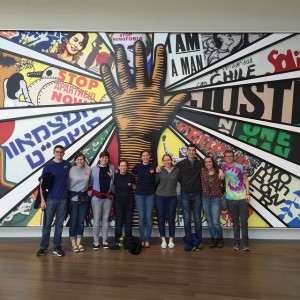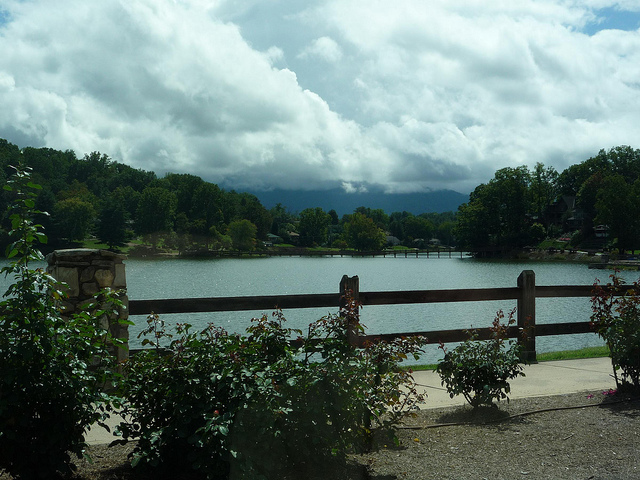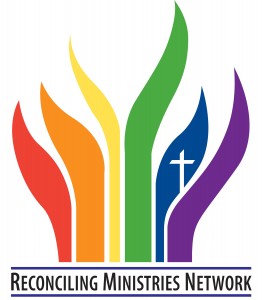Last weekend I had the honor of serving as celebrant for the wedding of two recently graduated alumni. I’ve known both the bride and groom for their entire undergraduate careers, and their wedding brought three reception tables’s worth of Wesley students and alumni to town. After they were married at the church, we spent a gorgeous early summer evening, sun descending, shadows gathering, on a luscious winery estate lawn, sipping drinks and enjoying the company and the occasion.
Late into the evening, as shadows gave way to stars, and it couldn’t get any more delicious, Meredith* said, “Can I ask you a question?”
I was sitting next to my husband, flanked on one side by an alumna from last year and on the other side by Meredith, who just graduated in May and who will be coming back to grad school in a year. It so happens both of these alumnae are gay.

Wesley students visiting the Center for Civil and Human Rights, Atlanta, GA.
Meredith said, “I know you can’t do a wedding for me and, obviously, it’s a ways off because I don’t have anyone in mind, but at this point, I don’t have another minister. You know me best and you’re still my minister. Even if you couldn’t be the one to marry me, would you do my pre-marital counseling?”
I have known Meredith her entire undergraduate career and, before that, her sister. I am booked to be the officiant for her sister’s wedding next year (to yet another Wesley alumnus) and was about to meet with that couple for their first pre-marital meeting this week, which is partly why Meredith was asking.
She told me she’d spent two hours on the phone with her sister earlier in the week, talking about how excited she was to start planning for her wedding and marriage. Meredith, who grew up in the church just like her sister, and who did the hard work of making space for a faith community during college (just like her sister), and who is determined to keep growing in her discipleship into her adult years and her future relationships, including marriage (just like her sister) – this beautiful young beloved child of God did not even ask me, her pastor, if I’d do her one-day wedding. Even her question was trimmed down to size for compliance with our current UMC Discipline. All she asked me is if, even though it may not be possible for me to be the celebrant at her wedding one day, could she please spend time with me preparing for it? Meredith, whose discipleship and faith community has been as similar as possible to her own sister’s for their whole lives, and who learned well the Church’s own teaching about the importance of having a pastoral spiritual guide and a gathered community of faith for life’s passages, didn’t even ask me for what she really wants and needs. And deserves.
It sickens me to say she learned those other lessons our Church is teaching, too – that not all of what we do and say is meant for her. I feel sick to my stomach and teary just writing this.
Imagine how difficult it was for me on that beautiful night, in the midst of our beloved gathered community, to hear Meredith ask for such a small crumb from the children’s table (Matthew 15: 21-28; Mark 7: 24-30).
Now imagine how hard it was for her.
She made it easier on me than she should have. Both she and the other alumna were kind and generous in the conversation we had, but that moment dampened the evening for me – not that she brought it up, but that she had to at all.
There is no amount of forethought and hypothesis that can predict what you’ll actually do, given the right situation. Though this is still where I stand, I don’t know how long I’ll be able to keep standing here.
Oh, UMC, don’t make me do this! Don’t make me choose you over God’s own children. Don’t make me choose the Gospel over you.
__
*Meredith gave me permission to use her name and to write about this, and said, “I hope the UMC can get it together by the time I want to get married.” Me, too.


